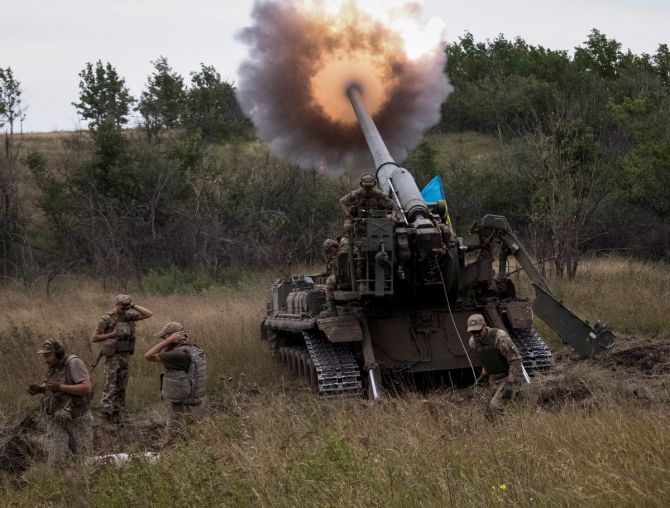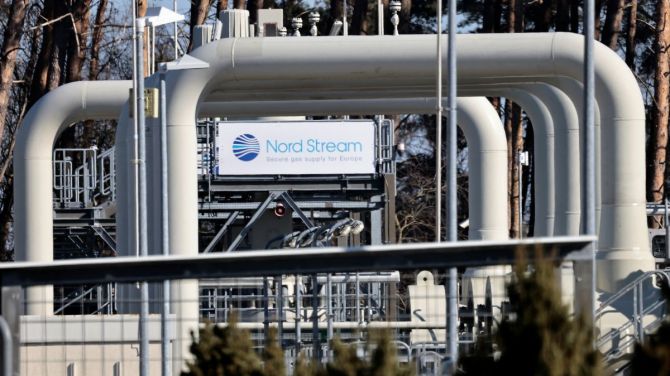'The clean break between Russia and Europe that this foolish attack is creating may actually last long.'
'It will undermine Europe and benefit the US and China.'

"In the Russian-Ukrainian conflict, Europe finds itself between a rock and a hard place because its conduct is dictated by restraint in order not to inflame the situation to a point of no return," Dr Yannick Mireur, a French political scientist who has specialised in America's relations with Europe, tells Rediff.com Senior Contributor Rashme Sehgal.
Part one of a two-part interview:
There seems to be very strong anti-American sentiment sweeping across Europe. During my travels across Germany, France and Switzerland, the average man-on-the-street blamed the US for accelerating the conflict in Ukraine by providing the Ukranian government with a constant flow of weapons.
This is not to say that they condoned the Russian invasion, but they believe US policies are playing a key role in ensuring the decline of both the unity and the economic well being of Europe.
On the whole, the European population is not dramatically anti-American, even though the recent strategic blunders, most lately the withdrawal from Afghanistan and the inevitable return of Taliban rule, make it aware that the US alliance is not the only answer to security challenges.
I believe a majority of Europeans agree with supporting Ukraine as the Russian military action is an aggression whose final goal remains unclear to most.
In the Russian-Ukrainian conflict, Europe finds itself between a rock and a hard place because its conduct is dictated by restraint in order not to inflame the situation to a point of no return.
The conflict exposes Europe's vulnerabilities, primarily the dependence of Germany, the continent's economic powerhouse, to Russian energy supplies.
The German authorities made a far-reaching decision in 2011 in the wake of the Fukushima accident by phasing out their nuclear energy and by turning their back on the French-German cooperation in that industry.
From that point of view I believe the former German chancellor's (Angela Merkel) widely celebrated statesmanship has been over-rated!
It has always been a US policy to divide and rule over Europe.
The revival of NATO, the Atlantic military alliance, is also a revival of US diplomatic and political influence.
With Sweden and Finland joining it, NATO is about to expand, something that was unthinkable a few months ago.
In addition, the US benefits a unique opportunity to sell their own gas to Europe as economic sanctions against Russia open a breach in supply contracts.
Both the US and Europe are now facing a conundrum: Supporting Ukraine against Russian aggression without pushing Putin into a corner that may lead to a wider conflict as happened in 1914.

Most of the people I spoke to in Europe believed their governments were behaving as puppets in the hands of the US who was arm twisting their countries for example in not buying cheap gas from Russia.
This was likely to result in a quantum increase in prices of gas from September onwards.
What lever is the US using to pressurise the European nations in this manner?
The leading economies of continental Europe like Germany and Italy have a long history of importing Russian gas and, however paradoxical that may seem, the commercial contracts have never suffered from the Cold War.
It has long been thought that energy relations between Europe and Russia were of interdependence, the fixed assets of the gas industry (gas pipelines) not allowing the flexibility that the global oil market offer with tankers being redirected to new destinations in case of unforeseen events.
What the US was opposed to was German plans to increase Russian supplies through the construction of new undersea gas pipelines called Nord Stream I and II connecting Russia and Germany directly by sea, bypassing transit-fee countries like Poland.
Former (German) chancellors (Gerard) Schroder and Merkel had supported it.
The steep rise of gas prices today is the consequence of the Russian invasion and governments are actually subsidising the most vulnerable households to mitigate the effects on their living standards.
As Europe tries to diversify its supplies and boost renewable energy, importing US gas -- extracted through the ecologically damaging fracking techniques -- is one alternative, among others.

Maybe the assumptions of the man-on-the-street that the government favour the rich against the poor are simplistic, but they hold the corporate, whether it be the US owned arms industry for the mishandling of the war in Ukraine.
These corporates through the mechanism of the US State were seen to be 'arm twisting' their respective governments into following their diktat.A
With you having specialiSed in US studies, how far is this perception correct?
The man-on-the-street anywhere, including in the US itself, is wary of big business.
The balance between state and market was the big question of the 20th century and remains a key one in the 21st, as the rise of the populist vote demonstrates.
In the US, the military-industrial complex against which (Dwight David) Eisenhower (US president from 1951 to 1961) warned his fellow citizens in his farewell address, holds a decisive influence.
The catastrophic invasion of Iraq in 2003, based on dubious nation-building theories and other social engineering fantasies, largely benefitted the defence sector.
But blaming large corporations or pretending the US is manipulating societies resorts to similar fantasies.
The reality is more complex, it results from the interplay of diverse forces that, as the Russian regime's failure to quickly take control of Ukraine shows, are seldom either predictable or fully under control.
In fact, the rationale behind Putin's action against Kyiv remains hard to decipher beyond seizing industrial assets in Eastern Ukraine.
Among its counterproductive effects has been the rise of a Ukrainian national consciousness.
The clean break between Russia and Europe that this foolish attack is creating may actually last long.
It will undermine Europe and benefit the US and China.

In retrospect, what were the factors that precipitated President Putin into invading Ukraine?
It is essential to remember the backdrop here. The seemingly drifting away of Kyiv, the cradle of Russian culture, from Moscow's influence following the fall of (Viktor) Yanukovich and the US-supported Maidan Revolution of 2014, is key.
Maidan inflamed the cultural divide among Russian-speaking Ukrainians, particularly in the southeast where the current military front is located, and others.
Shortly after Russia reacted by supporting secessionist forces in that region and annexing Crimea.
Later, the election of (Belarus strongman) Lukachenko and (Volodymyr) Zelenskyy, the comic TV showman, and the cat-and-mouse game played by the US about the looming perspective of Ukraine joining NATO, further exasperated the Kremlin's nomenklatura and prompted military action.
A significant example of Ukraine's new direction was the replacement of Russian nuclear fuel supplies for Ukrainian power plants by US material and the connection of the power system with Europe's.
Russia now seeks to unplug the Zaporizhzhya plant it occupies from the Ukrainian power network and connect it to the Russian system to power Crimea.
Feature Presentation: Aslam Hunani/Rediff.com











 © 2025
© 2025